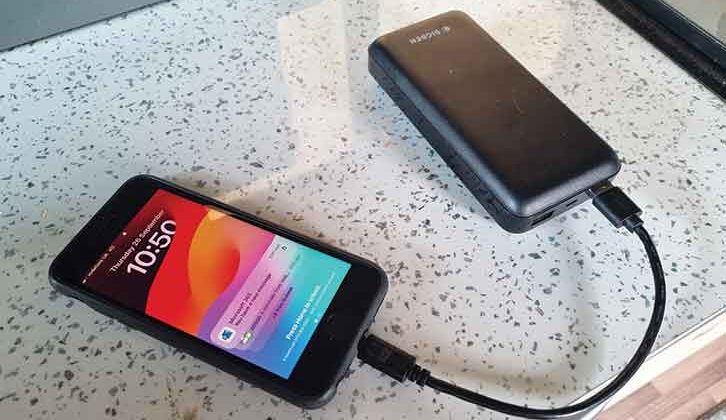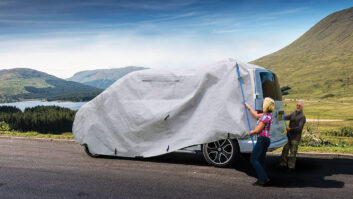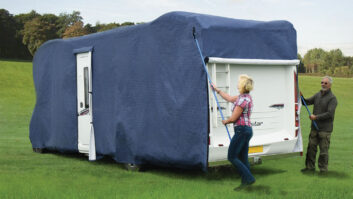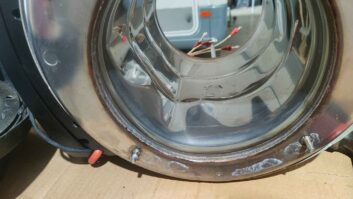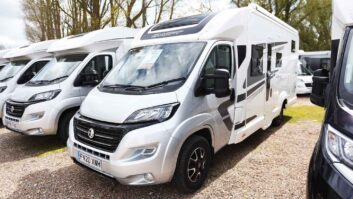A recent experience made me realise how challenging it can be in a foreign country when things go wrong. In fact, it makes a useful case study if you’re taking a motorhome on a European tour, highlighting the importance of breakdown cover.
As a journalist specialising in the technical side of motorhomes and campervans, it is fair to say that I’m not shy with a spanner and regularly maintain all my vehicles – you may, for instance, have seen my tips on motorhome maintenance.
My campervan isn’t that old, either – a 2016 Renault Trafic, bought new, regularly serviced at the main dealer and with an unblemished reliability record. So when a dashboard warning light popped up on day two of our French holiday, it was something of a shock.
Fortunately, just before leaving the UK, we had topped up our European breakdown cover for a motorhome to a single-trip RAC policy – this £130 outlay proved one of the wisest moves we ever made.
Repairs, alternative transport and accommodation costs rapidly mount – and if you think your ’van will be repaired quite as rapidly, think again.
If you are thinking of touring abroad soon, don’t miss our guidance on how to deal with motorhome accidents overseas either.
What happened on my European tour
After our first night in France, on a delightful Saturday morning we woke up fresh, and breakfasted well at our Normandy campsite. We were merrily convoying with friends on an autoroute heading towards the Dordogne, when suddenly, a motorhome fault occurred, as a warning flashed up on the computer screen, with a red light saying ‘Stop’.
It also showed a message I’d never seen before: ‘Engine Failure Hazard’. This looked bad, but first, I pulled safely into a layby and tried the good old ‘switch it off and on again’ technique.
The engine sounded fine, there were no nasty noises and nothing felt or smelt hot. But the message remained. Time to investigate. We headed off at the next exit, found a safe place to stop on a quiet rural road and popped the bonnet. The issue was pretty obvious – there was no coolant in it. You could also smell coolant. Had I forgotten to check it, or was it just a bit low?

We poured some water from the fresh-water tank into the reservoir and were disappointed to see it all dumped onto the road. The leak seemed to be from the rear of the engine. Not good.
Our friends joined us in their camper and out came the motorhome tool kit, followed by various plastic covers, the battery, the battery box and the ECU (which is bolted to the battery box on a Renault), so we could access the source of the leak. Part of a coolant pipe – a plastic elbow to the rear of the engine, surrounded by all manner of plumbing and wiring – had split and was oozing fluid. Because it was all part of a one-piece moulded pipe system with about eight outlets, this wasn’t just a case of replacing or patching a coolant hose, and access was a nightmare. We tried using a bicycle puncture repair kit, but to no avail. Water kept gushing out.

At this point I knew we couldn’t do a roadside fix and would need recovery. Driving any distance without coolant would simply cause the engine to overheat and destroy it, resulting in a much bigger bill. We had a Renault, we were in France and it just needed a new coolant pipe. How hard could it be?

The weekend in France
In the UK, we’re spoiled with 24-hour petrol stations and supermarkets, and it’s easy to assume other countries will be the same once you’ve disembarked from the ferry or Eurotunnel. I can assure you they’re not.
Few garages in France open at the weekend and on a Saturday afternoon, you have very little chance of a breakdown even being assessed until Monday morning at the earliest.

When we broke down it was about 4pm, so our RAC European breakdown cover arranged for a tow truck to take our motorhome to a secure compound for the weekend and then to a nearby garage on the Monday. We decided to stay near the compound so we could be on hand at the garage, to make sure they knew what the issue was and could order the parts rapidly and fix it as soon as possible.
While all this was happening, our friends had gone off in their camper to scout for a campsite. They found one offering basic pods about 10 miles away and collected us and all our belongings from the storage compound. If we had needed to wait for a hire car, it would have been even later still when we finally made it to the campsite.

On the Sunday, we had to rely on our friends’ campervan to be mobile and for cooking – all the local restaurants seemed to be shut on Sundays. In June!
By the time Monday rolled around, we’d missed two of our pre-booked sites and were way behind schedule, with no way of knowing when our vehicle would be fixed.
Motorhome-specific issues
Break down with a car in the UK and Europe and it’s not that big a deal. Yes, your main vehicle will be out of action, but the breakdown firm will get you a hire car. It might not be as spacious as your own, it might cost you a few hours and you’ll have to take it back to the hire car centre, but you’ll cope.
With a leisure vehicle, it’s different; you’ve lost your accommodation and a vast amount of storage space. The key point is that you’re not going to get a replacement hire leisure vehicle. You are likely to get a much smaller car.
Think of everything you’ve loaded your motorhome with. You probably won’t have any bags with you (all your clothing is in the lockers), so you’ll rely on shopping bags and anything else you can find. Any bulky kit – ebikes or kayaks, say – will have to be left behind.
Some of the gear you rely on – the vehicle battery and charging systems – is built into the vehicle, so you have to do without that. With no battery bank, your phone might run flat, so it could be worth bringing the best portable power station for van life with you, or at the least, a power pack.
This is your lifeline to the breakdown firm and Google Translate, so don’t underestimate its importance.
Trying to figure out what to take with you is challenging, especially if you have to squeeze it all into a taxi or the recovery truck cab.
Having lost your transportation and accommodation, you’ll need to use hotels and guest houses, or spend time finding sites that offer pods, glamping tents or chalets. Again, this research means using up your phone battery.
All your food storage and cooking facilities in the kitchen will be left behind, so you’ll need to empty the fridge (I didn’t, but trust me on this one…) and budget for more eating out or barbecues.
These costs escalate rapidly, so your bank cards will take a battering. Keep all receipts and make sure you ask for one for everything you buy.
Prepare to change plans
If you’ve pre-booked campsites, you’ll need to see if you can get refunds or alter the bookings, to allow for a later arrival, or perhaps transfer the pitch to a camping pod if you can. In reality, without your ’van, you need to accept that you’ll have to adapt your holiday.
In our case, the two-day delay while the garage assessed the repair meant we had to abandon our journey south to the pre-booked lakeside pitch in the Dordogne – there wasn’t time to get down there and back in a hire vehicle.

which was a real find. Best of all, the site had a wonderful restaurant and bar…
Instead, we headed to a much nearer lake near Royan and had to ring around trying to find campsites with glamping tents. Happily, France has lots of these, no matter the season.
At first, it was quite exciting having to adapt our plans, and we found a gem of a site (Camping Les Ourmes Hourtin, near the beautiful Lac d’Hourtin), but constant calls to the breakdown firm and the evolving repair story added an unwelcome layer of stress. If you’re not patient (I’m not), it gets wearing.
The breakdown firm
RAC European Breakdown worked well and their helpful staff all spoke English. They listened to us, didn’t waste time sending a roadside repair van (which would have been pointless) and had a tow truck out to us within four hours.
Apart from a bit of confusion over our location (caused by two parallel roads named La Lande du Feu – only in France!) there wasn’t much of an issue.
However, one potential issue with any breakdown firm is that of internal communication. Call handlers work shifts, so you rely on them reading the notes of the previous handler, and the notes being accurate. We were dealing with a French call centre, increasing the chance of miscommunications.
The call handlers also don’t always have extensive technical knowledge of vehicles, so you can’t necessarily rely on them accurately telling the repair garage about the issues. This is why I decided to head straight to the repair garage (once the RAC had texted the address), to ensure they knew the fault and wouldn’t waste time diagnosing the leak. I even went armed with the part number of the new hose coolant unit!
The ’van arrived at the helpful Garage Motier in Châteaubriant by 11am on the Monday morning. After using Google Translate to explain the problem and showing photos of the new part needed (nobody spoke English at the garage), we were confident they understood the problem. We explained we had a ferry booked in a week’s time and the garage staff said they’d do their best.

Then there was nothing more we could do but grab as many belongings as possible – with our watersports gear, a paddleboard, a kayak and a battery bank – and head to the hire car firm arranged by the RAC.
However, it was now lunchtime and Europcar was shut for an hour. We had piles of bags of belongings and bulky kit, so when Europcar initially offered us a Renault Megane, it didn’t go down well. After a lot of haggling and some extra fees, they eventually let us have an Opel van.
The hire vehicle gave us a real boost and it was great to have independent transport again. But we relied heavily on the RAC to approve the costs of accommodation and keep us informed of the repair progress. Again, it was absolutely vital to have good reception and a fully charged phone battery. Over the next few days, the repair news went from “It might be ready for your ferry home in a week” to “We’re not sure when it will be ready.”
We were now staying at a hotel in Bordeaux, enjoying the delights of a wine festival we’d pre-booked, when the RAC finally called to say, “It’s not going to be ready in time for the return ferry.” They couldn’t tell us when the ’van would be fixed because the garage was incredibly busy.

While we could use our return ferry tickets to hitch a ride with our friends in their campervan without extra cost, the issue we had was our belongings – there wasn’t the payload or space to carry everything back to the UK in one vehicle. With hindsight, we should have ditched the watersports kit and only focused on the essentials: passports and travel paperwork, our clothing, toiletries and phone chargers.
This meant we had to do a 5am dash from Bordeaux to Rennes (where our ’van was stored) to decant as much kit as possible into our broken vehicle and avoid overloading our friends’ camper.

Europcar also wanted the Opel taken back to the branch we collected it from, so we had to return that and swap it for a Nissan Qashqai, which could be dropped off on a one-way trip at the St Malo depot, near the ferry port.
The logistics became challenging and wasted four days of our holiday. One point is that while the breakdown firm can book hotels for you, it’s easier to book them yourself (making sure to stay under the daily limits and totals specified in your breakdown cover) and tell them where you’re staying.
Breakdown firm staff are not on the ground, so don’t always appreciate things like parking or proximity to suitable restaurants. You’re better off doing it yourself, so a credit card is vital.
In the end, we had just over a week in France, while the ’van enjoyed an extra month there!
Repatriation
So you’ve managed to make your way home without your vehicle, by ferry, train or plane. You just need to get your ’van sent back to your home as soon as it’s fixed. Shouldn’t take more than a couple of weeks, right?
Repairs in the peak of summer can take an age, as parts are not always in stock, demand for labour time is high and other clients are often prioritised over a leisure vehicle. This isn’t just an issue for France, it’s similar throughout Europe and the UK. A simple repair may be done quickly, but for anything more involved – like a complex coolant hose – you should be prepared for a wait.
Even when your vehicle has been fixed, don’t assume the breakdown firm will be poised outside the garage with a low-loader on standby to whisk your ’van home. Vehicles are often loaded in batches and the logistics can take some time.
In the case of my Renault, the RAC couldn’t return it to the UK for around three months, so I decided instead to self-repatriate it. This involved two taxi rides, two train journeys, a flight from Gatwick to Rennes, an overnight stay in a hotel and an autoroute dash to get the ferry home. It was not cheap and took two days of my time. And this was just from northern France!
Top tips
Your most important resource is your phone, so pack a large-capacity battery bank, a charging cable and a number of adaptors, to suit all mains adaptor types in the country you’re visiting.

to keep in touch with the breakdown firm. This now lives in the campervan
Although the breakdown cover call handlers all speak English, the rural garage staff almost certainly won’t and Google Translate will become your best friend. If your phone battery dies, you will be in a world of pain…
Without your camper, be prepared to pack light and only take essentials with you. You won’t get a hire camper and breakdown firms will often only provide you with a small car.
Pack a bag or rucksack, so you can easily transport clothing and essentials – otherwise you’ll be lugging lots of shopping bags around with you. Forget your original plans and pack light.
You’ll invariably miss ferries/site booking dates and pre-booked trips, so you’ll need to be on your phone to juggle things around. That battery bank will become vital – we had to buy one.
Pack a credit card with a limit of at least £5000. Not all costs are instantly covered by the breakdown firm and many have to be reclaimed at a later date. This could take time – it took us three months to get all the approved costs back from the RAC.
Make sure your vehicle road tax is up to date, the ’van has a valid MOT and is insured, and that you have the logbook with it (we take a colour copy of this), because the breakdown firm may need to see the paperwork. Breakdown firms will not recover a vehicle without road tax or an MOT.

Receipts are vital – keep them safe and make sure you get receipts for taxis, hotels, hire car firms, breakdown firms and garages. Without them, you may not be able to claim that money back.
I’d recommend picking the highest level of breakdown cover your firm offers. The difference between basic and top-level cover is usually under £50 for a single vehicle trip, but this can have a massive effect on the daily budget for alternative accommodation, hire car costs and onward travel bills.
When we got our RAC motorhome breakdown cover before setting off on our European tour, it allowed up to €200 a day for accommodation, which proved vital in Bordeaux, where there were no campsites with glamping tents and we had to pay city centre hotel costs.
It even covered the cost of labour for the repair (over £300), although we had to pay the £170 for new parts. The higher cover we had included all of our self-repatriation costs, except for the loss of earnings for the time away.
Preventative maintenance
Some vehicle failures can be predicted. For example, if you skimp on servicing or don’t act on a minor problem, such as grinding brakes, you can expect it to develop into a larger one, which will not help to prolong the life of your motorhome.
Regular servicing, checking your motorhome’s tyre pressures and making sure the oil and coolant are topped up is vital.
But sometimes, it’s not a motorhome mistake that leads to the problem – after all, could we have done anything differently, to prevent the coolant hose failure on the Renault? It’s not the sort of thing that is normally replaced as part of regular servicing work and it’s not an item that is even visible unless several components are removed.
Even with the vehicle up in the air, it’s hard to see the rear section of the pipe. It was eight years old and the vehicle has covered 65,000 miles. Perhaps all the coolant hoses could have been renewed as a preventative measure, but this isn’t usual.
On an older ’van, replacing a failed section of hose is as simple as removing a couple of clips and slipping on a new hose, but with the complex emissions control systems of modern vehicles, these all-in-one moulded multi-outlet rubber and plastic hoses are the norm. It is not something unique to Renault.
Even an experienced DIYer can’t fit these hoses at the roadside and it’s quite a job for a repair garage.
The takeaway here is that this failure couldn’t have been predicted and there were no real tell-tale signs beforehand. With no way of knowing it would happen, in my opinion, good motorhome breakdown cover is vital for a European tour.
The verdict on breakdown cover for a European motorhome tour
After your travel insurance, vehicle breakdown cover is one of the most important items to purchase.
It is especially important if you have an older or low-value ’van, where the cost of repairs and repatriation might exceed its value.
Had we not spent £130 on our cover, we would have been over £2000 poorer and would have struggled to continue with our trip. Hopefully, you’ll never need to use it, but top-level breakdown cover could just save your holiday.
If you’re planning to head on your first tour in 2025, take a look at the 6 things Jo Davies learnt on her first motorhome trip.
Future Publishing Limited, the publisher of Practical Motorhome, provides the information in this article in good faith and makes no representation as to its completeness or accuracy. The material contained in this article should be used for informational purposes only and in no way should be relied upon as a substitute for independent insurance or breakdown cover advice. You should not act or refrain from acting based on any information provided in this feature and should consult with your own advisor regarding any questions you may have in relation to the matters discussed in this article. To the fullest extent permitted by law, neither Future nor its employees or agents shall have any liability in connection with the use of this information. You should check that any warranty is not affected before proceeding with technical work.
If you enjoyed reading this article, why not get the latest news, reviews and features delivered to your door or inbox every month? Take advantage of our brilliant Practical Motorhome SUBSCRIBERS’ OFFER and SIGN UP TO OUR NEWSLETTER for regular weekly updates on all things motorhome related.










